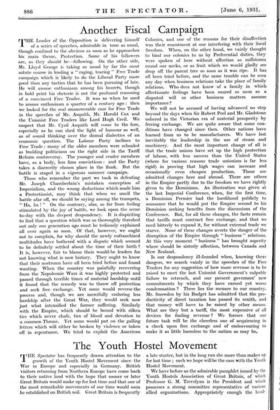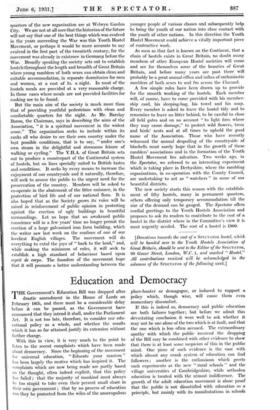The Youth Hostel Movement
THE Spectator has frequently drawn attention to the growth of the Youth Hostel Movement since the War in Europe and especially in Germany. British visitors returning from Northern Europe have come back to their native land with the hope that sooner or later Great Britain would make up for lost time and that one of the most remarkable movements of our time would soon be established on British soil. Great Britain is frequently a late starter, but in the long run she more than makes up for lost time ; such we hope will be the case with the Youth Hostel Movement.
We have before us the admirable pamphlet issued by the Youth Hostels Association of Great Britain, of which Professor G. M. Trevelyan is the President and which possesses a strong committee representative of various allied organizations. Appropriately enough the head- quarters of the new organization are at Welwyn Garden City. We are not at all sure that the historian of the future will not say that one of the best things which was evolved in the years succeeding the War was this Youth Hostel Movement, or perhaps it would be more accurate to say evolved in the first part of the twentieth century, for the movement was already in existence in Germany before the War. Broadly speaking the society sets out to establish hostels throughout the length and breadth of Great Britain where young ramblers of both sexes can obtain clean and suitable accommodation, in separate dormitories for men and women, at a cost of ls. a night. In most of the hostels meals are provided at a very reasonable charge. In those cases where meals are not provided facilities for cooking are to be found.
But the main aim of the society is much more than that of providing youthful pedestrians with clean and comfortable• quarters for the night. As Mr. Barclay Baron, the Chairman, says in describing the aims of the Association, " it is a spiritual movement in the widest sense." The organization seeks to include within its ranks all who desire to see their own country under the best possible conditions, that is to say, " under one's own steam in the delightful and strenuous leisure of walking or cycling." The Y.H.A. of Great Britain sets out to produce a counterpart of the Continental system of hostels, but on lines specially suited to British tastes and conditions. It seeks by every means to increase the enjoyment of our countryside and it naturally, therefore, will seek to arouse the public to the urgent need for the preservation of the country. Members will be asked to co-operate in the abatement of the litter nuisance, in the protection of bird life and of our national flora. It is also hoped that as the Society grows its voice will be raised in reinforcement of public opinion in protesting against the erection of ugly buildings in beautiful surroundings. Let us hope that an awakened public conscience will in a few years' time no longer permit the erection of a large galvanized iron farm building, which the writer saw last week on the confines of one of our loveliest English villages. The movement will do everything to extol the joys of " back to the land," and, while making the minimum of rules, it will seek to establish a high standard of behaviour based upon esprit de corps. The founders Of the movement hope that it will promote a better understanding between the younger people of various classes and subsequently help to bring the youth of our nation into close contact with the youth of other nations. In this direction the Youth Hostel Movement could achieve a vitally important piece of contructive work.
As soon as that fact is known on the Continent, that a chain of hostels exists in Great Britain, no doubt many members of other European Hostel societies will come and see for themselves some of the beauties of Great Britain, and before many years are past there will probably be a great annual efflux and influx of enthusiastic ramblers of both sexes to and fro across the Channel.
A few simple rules have been drawn up to provide for the smooth working of the hostels. Each member will, of course, have to come provided with his member- ship card, his sleeping-bag, his towel and his soap. Every member is asked to leave the hostel tidy and to remember to leave no litter behind, to be careful to close all field gates and on no account " to light fires where they may cause damage," to protect wild flowers, trees and birds' nests and at all times to uphold the good name of the Association. Those who have recently witnessed the annual despoiling of the countryside of bluebells must surely hope that in the growth of these ramblers' associations and in the formation of the Youth Hostel Movement lies salvation. Two weeks ago, in the Spectator, we referred to an interesting experiment which is taking place in Derbyshire, where the rambling organizations, in co-operation with the County Council, are undertaking to act as " watchers " in some of our beautiful districts.
The new society starts this season with the establish- ment of fifty hostels, many in permanent quarters, others offering only temporary accommodation till the size of the demand can be gauged. The Spectator offers cordial greetings to the Youth Hostels Association and proposes to ask its readers to contribute to the cost of a hostel in the district where in the Committee's view it is most urgently needed. The cost of a hostel is £800.
[Donations towards the cost of a SPECTATOR hostel, which will be handed over to the Youth Hostels Association of Great Britain, should be sent to the Editor of the SPECTATOR, 99 Gower Street, London, W.C. 1, and marked " Hostel." All contributions received will be acknowledged in the columns of the SPECTATOR of the following week.]







































 Previous page
Previous page